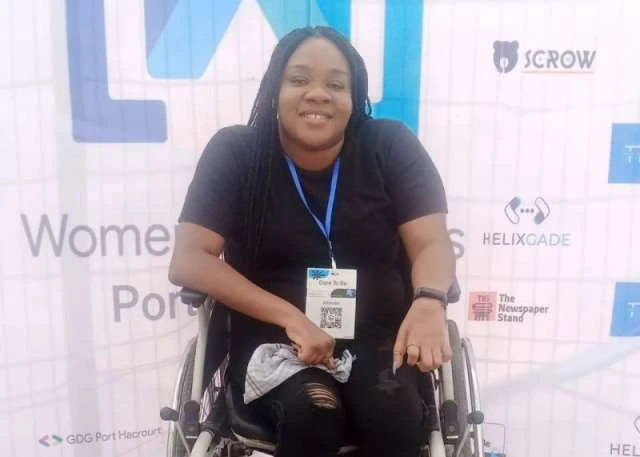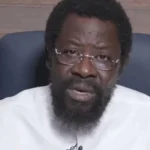
“I Was Carried Upstairs to Attend Class” – Disability Advocate’s Video Exposes Nigeria’s Failing Infrastructure, Lack of Inclusion

A video shared by a Disability Advocate and a Nguvu Change Leader, Adaobi Chuma-Okeke, on social media the day before the International Day of Persons with Disabilities has exposed Nigeria’s failing infrastructure and lack of inclusion.
In the video, Chuma-Okeke, a wheelchair user, recounted her experience as a student in Nigeria, where she had to rely on classmates to physically carry her upstairs to attend classes.
I finished my studies largely thanks to the help of supportive friends and classmates. I recall being physically carried upstairs to attend classes, and that experience, among many others, has inspired me to campaign for better accessibility in Nigerian schools,” she said.
The International Day of Persons with Disabilities is observed annually on December 3rd. It promotes the rights and well-being of persons with disabilities in all aspects of society and development. It also aims to increase awareness of the challenges faced by this community in political, social, economic, and cultural spheres.
The video, which reflects this year’s theme, ‘Amplifying The Leadership of Persons With Disabilities for an Inclusive and Sustainable Future’, has highlighted the barriers faced by Nigerians with disabilities, from inaccessible schools to public spaces that lack basic accommodations like ramps or elevators.
Although Nigeria’s Disability Rights Act mandates equal access and inclusion, Chuma-Okeke noted that the law remains largely unenforced.
Promises, policies, and laws must result in real, tangible changes. If every school – from primary to tertiary – had proper ramps and/or elevators, it would open up opportunities for countless children with disabilities to access their education,” she said.
She called on the Ministry of Education and the National Commission for Persons with Disabilities to take concrete steps to ensure accessibility in schools, workplaces, public transportation and healthcare services.
Aside from physical infrastructure, Nigeria’s disability community also faces challenges such as widespread stigmatisation and discrimination which often leave people with disabilities excluded from opportunities in education, employment, and public life. Public awareness about disability rights also remains low.
Chuma-Okeke urged leaders to focus on comprehensive policies that promote equal employment opportunities, social inclusion, and improved healthcare that would allow Nigerians with disabilities to live with dignity and respect.
Read More:
- Disney Unveils ‘Snow White’ Movie Trailer
- Despite Promises, Civil Servants and NYSC Members Yet to Receive N70,000 Minimum Wage
About The Author
Related Articles
Tinubu Government Delays Release of Signed Tax Acts to the Public
Four days after President Bola Tinubu announced the signing of four tax...
ByMayowa DurosinmiJune 30, 2025As Tinubu Urges Africa-Caribbean Unity in Saint Lucia, Over 272 Nigerians Killed in June Alone
While Nigerians deal with deadly violence, worsening hunger, and mass flooding, President...
ByWest Africa WeeklyJune 30, 2025You Can’t Tax a Dead Economy: Nigeria Is Suffocating Under Its Own Policies
As Nigeria’s Central Bank clings to its benchmark interest rate of 27.5...
ByWest Africa WeeklyJune 30, 2025“Wike is Not a Blessing to Us, He’s a Disaster” — Workers Protest in Nigeria’s Capital Over Unpaid Wages, Poor Working Conditions
Staff members of the Federal Capital Territory Administration (FCTA) in Abuja barricaded...
ByOluwasegun SanusiJune 30, 2025












Leave a comment